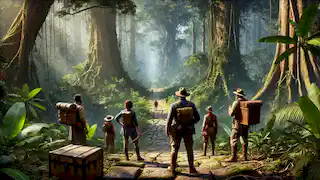Hidden deep in the dense jungles of the Amazon rainforest, on the border between Peru and Brazil, lies one of the most sought-after mysteries of the ancient world—the legendary Lost City of Paititi. For centuries, explorers, adventurers, and archaeologists have scoured the vast wilderness, hoping to find this fabled city of gold. Said to be a place of immense wealth and ancient knowledge, Paititi's existence has been debated for generations. Some believe it to be a real city abandoned by the Incas, while others dismiss it as mere legend. Yet, stories of its golden temples, sacred treasures, and lost knowledge continue to captivate the imagination of those who dare to dream.
The search for Paititi has cost many their lives, but it has also inspired countless expeditions, each with the hope of unraveling the mystery of this lost civilization. The following is the story of one such expedition, a tale of courage, perseverance, and the undying quest for knowledge. As we venture into the heart of the Amazon, let us follow in the footsteps of those who risked everything in their search for the Lost City of Paititi. The year was 1935, and the world was still reeling from the economic depression that had swept across nations. But amidst the global turmoil, there were those whose spirits could not be dimmed, whose hearts were set on adventure and discovery. One such individual was Dr. Alejandro Quispe, an archaeologist from Lima, Peru. His life’s work was dedicated to the study of ancient Incan civilization, and like many in his field, he had heard the whispers of Paititi, the golden city lost to time. Quispe had spent years piecing together fragments of ancient texts, deciphering cryptic clues left behind by the Incas before their fall to the Spanish conquistadors. After a particularly fruitful excavation near Cusco, he believed he had found the final piece of the puzzle—a stone tablet inscribed with a map that hinted at the location of Paititi. But the journey to find it would not be easy. Quispe knew he could not undertake this quest alone. He needed a team—a group of skilled explorers who could navigate the unforgiving terrain of the Amazon and survive the dangers that awaited them in the jungle. After months of preparation, Quispe assembled his team: an experienced guide named Manuel, a sharp-witted linguist named Maria, and an enigmatic treasure hunter from Brazil, João. Together, they set off on a journey that would take them deep into the heart of the unknown. The jungle was a world of its own, a vast and teeming ecosystem full of life, both beautiful and deadly. The towering trees stretched upwards, their branches creating a canopy that blocked out the sun. The humid air was thick with the sounds of insects, birds, and unseen creatures moving through the dense foliage. Quispe and his team trudged through the underbrush, cutting their way through the vines and vegetation with machetes. Their progress was slow, and the jungle did not give up its secrets easily. After several days of trekking through the rainforest, they came across their first clue—a series of ancient stone carvings etched into the side of a cliff. The carvings depicted a group of people, presumably Incas, carrying large treasures into the jungle. At the base of the cliff, they found what appeared to be an old trail, overgrown with vines but still discernible. This, Quispe believed, was the path that would lead them to Paititi. As they continued their journey, the jungle became increasingly treacherous. Dangerous animals lurked in the shadows, and the threat of disease loomed over them. The heat was oppressive, and the team began to suffer from exhaustion. Yet, despite these hardships, they pressed on, driven by the allure of discovering the Lost City. Quispe could feel that they were getting closer. Each step they took brought them nearer to their goal, but it also brought new dangers. After weeks of navigating through the jungle, they finally reached the edge of a great river, its waters swift and powerful. Quispe recognized it from the descriptions in the ancient texts—it was the Sacred River, a natural barrier that protected Paititi from intruders. Crossing the river would be a challenge. They constructed a makeshift raft and cautiously made their way across, fighting against the current. It was here, on the banks of the Sacred River, that they encountered an unexpected ally—a group of indigenous people who had been watching them from afar. The tribe, known as the Matsés, were initially wary of the outsiders, but through Maria’s skillful communication and João’s offering of gifts, they gained the tribe’s trust. The Matsés spoke of an ancient legend passed down through generations—a city hidden in the mountains, protected by the spirits of their ancestors. The tribe agreed to guide Quispe and his team to the base of the mountains, where the entrance to Paititi was believed to be hidden. The journey was fraught with danger, as they had to pass through treacherous terrain and avoid hostile wildlife, but with the Matsés as their guides, they felt more confident than ever. The mountains loomed ahead, their jagged peaks shrouded in mist. The Matsés led them to a hidden path that wound its way up into the mountains. The air grew cooler as they ascended, and the jungle gave way to rocky cliffs and steep ravines. Quispe marveled at the ingenuity of the Incas, who had created this secret trail to protect their most sacred city. The higher they climbed, the more evident it became that they were nearing their destination. Strange symbols and carvings began to appear on the rocks around them, marking the way. Quispe could barely contain his excitement—he was on the verge of discovering one of the greatest archaeological finds in history. But as they neared the summit, disaster struck. A landslide, triggered by the shifting earth, sent rocks and debris tumbling down the mountain. Quispe’s team was caught in the middle of the chaos, and they were forced to take cover as the landslide ravaged the trail. When the dust finally settled, they found themselves cut off from their original path. Worse still, one of their members had been injured in the chaos. Manuel, their guide, had suffered a severe injury to his leg, and they had no choice but to stop and tend to him. The situation seemed grim—without Manuel, they would be hard-pressed to find their way through the mountains. But Quispe refused to give up. They had come too far to turn back now. With Manuel unable to continue, the remaining members of the team pressed on. João took over as the lead, using his knowledge of the terrain to guide them through the treacherous mountains. As they descended into the valley on the other side, they finally caught their first glimpse of Paititi. It was unlike anything they had ever seen—a sprawling city of stone and gold, nestled in the heart of the jungle, untouched by time. The city was a testament to the greatness of the Inca civilization. Towering structures of gold and stone rose from the ground, their surfaces adorned with intricate carvings and symbols. In the center of the city stood a massive temple, its golden walls gleaming in the sunlight. The air was thick with the scent of ancient incense, and the sound of distant chants echoed through the streets. But Paititi was not abandoned. As Quispe and his team explored the city, they encountered the descendants of the original inhabitants—an isolated community that had lived in seclusion for centuries, preserving the ancient ways of the Incas. These people, who called themselves the Guardians of Paititi, had remained hidden from the outside world, protecting the city and its treasures from those who would seek to exploit them. The Guardians were wary of Quispe and his team, but they soon realized that these outsiders were not like the conquistadors of old. Quispe explained that he sought knowledge, not wealth, and that he wished to learn from the wisdom of their ancestors. After much deliberation, the Guardians allowed Quispe and his team to study the city, under strict supervision. For weeks, Quispe and his team explored the city, documenting its structures, artifacts, and history. They discovered vast stores of knowledge—ancient texts that had been preserved in the temple, detailing the rise and fall of the Inca Empire, as well as their spiritual beliefs and practices. The temple itself was a marvel of engineering, with hidden chambers and tunnels that held untold treasures. One of the most remarkable discoveries was a room filled with golden statues, each representing a different deity of the Inca pantheon. The craftsmanship was unparalleled, and the sheer amount of gold was staggering. Yet, despite the wealth before them, Quispe and his team knew that the true value of Paititi lay in its history and culture. But their time in Paititi was limited. The Guardians made it clear that they could not stay forever, and that the city must remain a secret. Quispe reluctantly agreed, knowing that to reveal Paititi to the world would invite ruin upon this sacred place. With heavy hearts, Quispe and his team began their journey back to the outside world. They had uncovered the truth about Paititi, but they knew that they could never fully share it. The Guardians had entrusted them with the knowledge of their ancestors, and they had sworn to protect the city’s location. As they made their way back through the jungle, Quispe reflected on the significance of their discovery. Paititi was more than just a lost city of gold—it was a symbol of the resilience and ingenuity of the Inca civilization, a reminder of the rich cultural heritage that had been nearly erased by the Spanish conquest. Upon their return to Lima, Quispe wrote extensively about his findings, though he kept the exact location of Paititi a closely guarded secret. The world would never know the full story of the Lost City, but Quispe was content knowing that he had uncovered one of history’s greatest mysteries. The Lost City of Paititi remains one of the most tantalizing mysteries of the ancient world. Though its exact location may never be revealed, the stories of its golden temples, sacred treasures, and hidden knowledge continue to inspire those who seek adventure and discovery. In the end, the search for Paititi is not just a quest for riches, but a journey into the heart of history itself.The Call of the Jungle
Into the Amazon
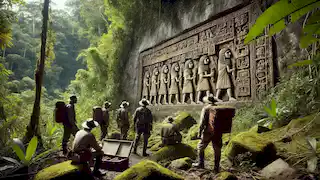
The Sacred River
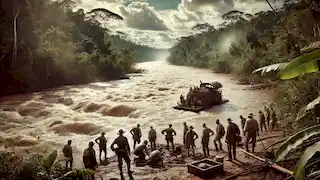
The Hidden Path
The Final Descent
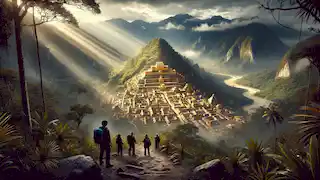
The Treasures of Paititi
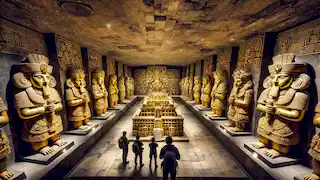
The Return to Civilization
Conclusion
